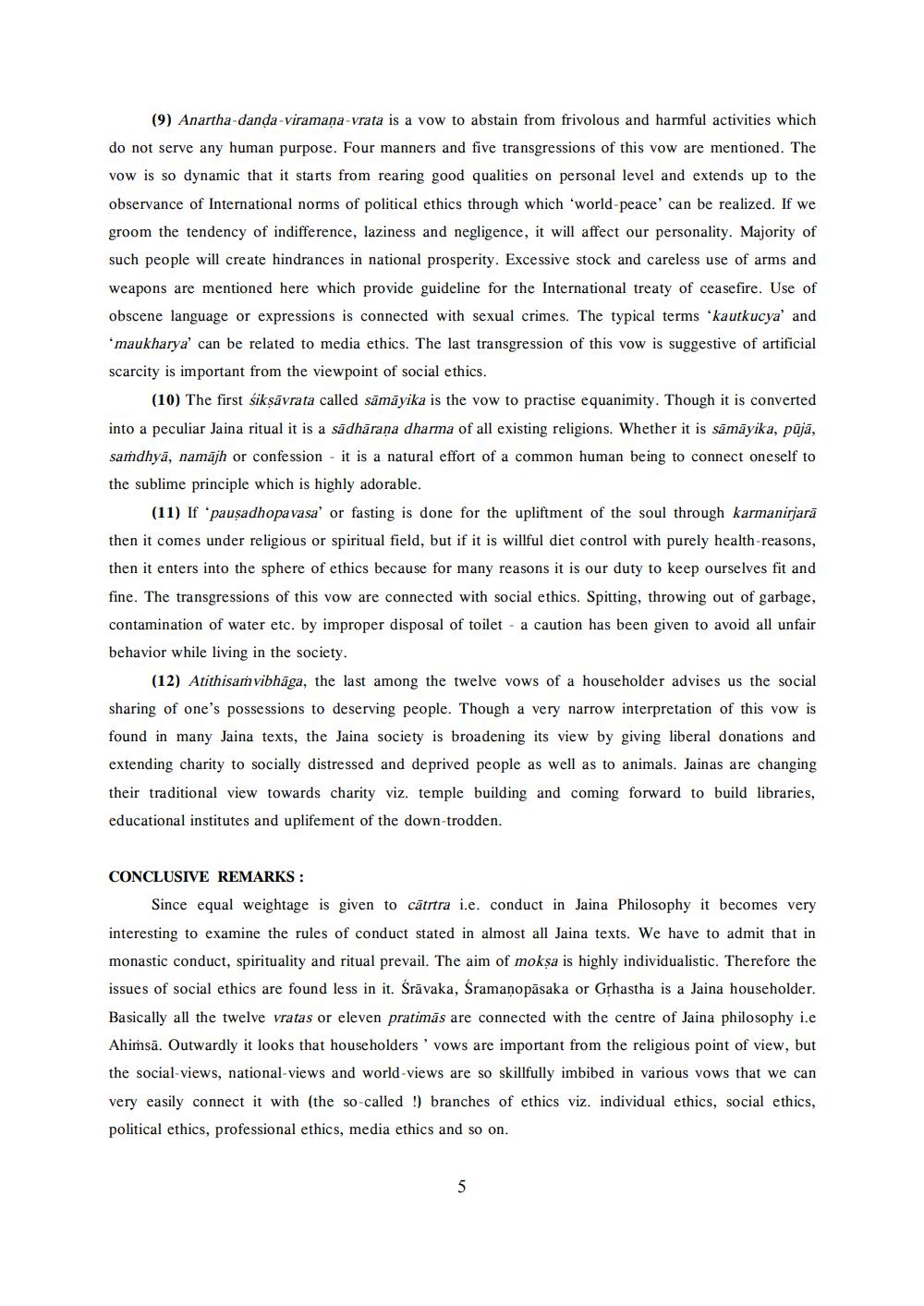Book Title: Etical Values Reflected in Jain Philosophy Author(s): Nalini Joshi Publisher: Nalini Joshi View full book textPage 5
________________ (9) Anartha-danda-viramana-vrata is a vow to abstain from frivolous and harmful activities which do not serve any human purpose. Four manners and five transgressions of this vow are mentioned. The vow is so dynamic that it starts from rearing good qualities on personal level and extends up to the observance of International norms of political ethics through which 'world-peace' can be realized. If we groom the tendency of indifference, laziness and negligence, it will affect our personality. Majority of such people will create hindrances in national prosperity. Excessive stock and careless use of arms and weapons are mentioned here which provide guideline for the International treaty of ceasefire. Use of obscene language or expressions is connected with sexual crimes. The typical terms 'kautkucya' and maukharya' can be related to media ethics. The last transgression of this vow is suggestive of artificial scarcity is important from the viewpoint of social ethics. (10) The first śikṣāvrata called sāmāyika is the vow to practise equanimity. Though it is converted into a peculiar Jaina ritual it is a sādhārana dharma of all existing religions. Whether it is sāmāyika, pājā, sandhyā, namājh or confession - it is a natural effort of a common human being to connect oneself to the sublime principle which is highly adorable. (11) If 'pausadhopavasa' or fasting is done for the upliftment of the soul through karmanirjarā then it comes under religious or spiritual field, but if it is willful diet control with purely health-reasons, then it enters into the sphere of ethics because for many reasons it is our duty to keep ourselves fit and fine. The transgressions of this vow are connected with social ethics. Spitting, throwing out of garbage, contamination of water etc. by improper disposal of toilet - a caution has been given to avoid all unfair behavior while living in the society. (12) Atithisaṁvibhāga, the last among the twelve vows of a householder advises us the social sharing of one's possessions to deserving people. Though a very narrow interpretation of this vow is found in many Jaina texts, the Jaina society is broadening its view by giving liberal donations and extending charity to socially distressed and deprived people as well as to animals. Jainas are changing their traditional view towards charity viz. temple building and coming forward to build libraries, educational institutes and uplifement of the downtrodden. CONCLUSIVE REMARKS : Since equal weightage is given to cātrtra i.e. conduct in Jaina Philosophy it becomes very interesting to examine the rules of conduct stated in almost all Jaina texts. We have to admit that in monastic conduct, spirituality and ritual prevail. The aim of moksa is highly individualistic. Therefore the issues of social ethics are found less in it. Srāvaka, Sramanopāsaka or Grhastha is a Jaina householder. Basically all the twelve vratas or eleven pratimās are connected with the centre of Jaina philosophy i.e Ahimsā. Outwardly it looks that householders' vows are important from the religious point of view, but the social-views, national views and world-views are so skillfully imbibed in various vows that we can very easily connect it with (the so-called !) branches of ethics viz. individual ethics, social ethics, political ethics, professional ethics, media ethics and so on.Page Navigation
1 ... 3 4 5 6
